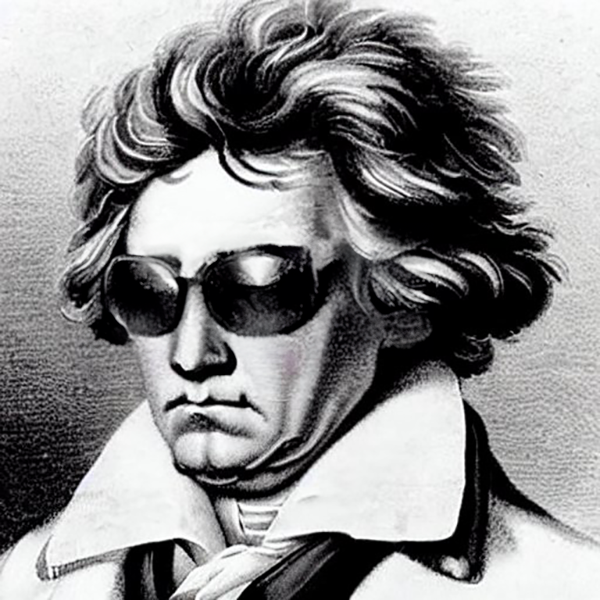Beethoven’s Immortal Legacy
Ludwig van Beethoven is a name that has transcended time, resonating with music lovers and scholars alike. Born in 1770 in Bonn, Germany, his life was one of immense creativity, personal struggle, and unmatched genius. From his early beginnings to his revolutionary compositions that continue to captivate generations, Beethoven remains one of the most influential figures in the world of classical music. But beyond his iconic works, there are countless questions about his life and death that still fascinate many today.
In this post, we’ll explore Beethoven’s journey from birth to death, diving deep into the pivotal moments that shaped him, while answering some of the most common questions surrounding his life. How did Beethoven die? When was Beethoven born, and where? We’ll address all of these queries and more as we walk through the incredible story of this legendary composer.
If you’re new to Beethoven, you might also enjoy checking out my articles 11 Reasons Why Beethoven is a Great Composer and Deaf Beethoven FAQ for more insights into what made his music so powerful and how he overcame deafness to create some of his most famous works.
You might ask yourself, “When did Beethoven live?” or “What did he look like?” Don’t worry—we’ll cover all of that and more. Whether you’re curious about Beethoven’s early life, his health struggles, or how he became one of the greatest composers in history, we’ve got you covered.
So, let’s take a journey through Beethoven’s life—from his humble beginnings in Bonn to his final days in Vienna—and discover what made his legacy so unforgettable.
Beethoven’s Early Life: Where It All Began
Where Was Beethoven Born?
Ludwig van Beethoven was born on December 17, 1770, in the city of Bonn, which was part of the Electorate of Cologne in the Holy Roman Empire—modern-day Germany. However, it’s important to note that records suggest Beethoven may have been born on December 16 and baptized on December 17, as infant baptisms were common soon after birth. Where and when was Beethoven born? is a question historians often discuss, but his baptism date is officially recognized as December 17.
Beethoven was born into a musical family. His grandfather, Ludwig van Beethoven, was a well-respected court musician, and his father, Johann van Beethoven, was also a court tenor and instrumental in his early musical training. Where did Beethoven grow up? Primarily in Bonn, a culturally rich city of the time, Beethoven spent his formative years here, absorbing the music and culture of the Enlightenment era.
What Country Was Beethoven Born In?
Beethoven was born in what we now know as Germany, but back in 1770, the country was part of the Holy Roman Empire. The political landscape of Europe was vastly different, and the territory of modern-day Germany was split into various states and electorates. Bonn, the city where Beethoven was born, was one such territory under the rule of the Electorate of Cologne. Beethoven’s German nationality is significant when considering the rich musical traditions he was born into and would later build upon.
What Day Was Beethoven Born?
Though officially baptized on December 17, Ludwig van Beethoven was likely born on December 16, 1770. His birth is shrouded in a bit of mystery, as it was common practice to baptize children a day after their birth to ensure their soul was protected, but December 17 remains the date commonly celebrated.
What City Was Beethoven Born In?
Beethoven was born in the city of Bonn, a place that shaped much of his early life. Bonn, located along the Rhine River, was a vibrant cultural hub in the 18th century, with a flourishing court that influenced Beethoven’s early exposure to music. Despite later moving to Vienna, Beethoven’s roots in Bonn played an essential role in his development as an artist.
Beethoven’s Family and Siblings
How Many Siblings Did Beethoven Have?
Ludwig van Beethoven came from a large family, though only a few of his siblings survived into adulthood. He was the second-born of seven children, but sadly, many of his siblings did not live beyond infancy. This was a common occurrence in the late 18th century when childhood mortality rates were high. Of Beethoven’s seven siblings, only two survived into adulthood: his younger brothers, Kaspar Karl (born in 1774) and Nikolaus Johann (born in 1776).
What Was Beethoven’s Family Like?
Beethoven’s family had a complex dynamic. His father, Johann van Beethoven, was a court musician with a troubled life. Johann is often remembered for his strict and at times abusive parenting style, particularly in Beethoven’s early musical education. Johann’s ambition to turn young Ludwig into a musical prodigy similar to Mozart meant he pushed his son rigorously, which often led to tension in the household. Despite these hardships, Beethoven inherited his father’s musical talent, which paved the way for his later success.
His mother, Maria Magdalena Keverich, is described as a gentle and kind woman who was the stabilizing force in Beethoven’s turbulent childhood. She passed away when Beethoven was just 17 years old, a loss that deeply affected him.
Where Did Beethoven Grow Up?
Beethoven spent most of his childhood in Bonn, Germany. This environment provided him with early exposure to court life and the vibrant musical culture of the time. His family’s connections to the court in Bonn helped shape his musical journey from a very young age. After his mother’s death, Beethoven assumed the role of head of the household, caring for his younger siblings and financially supporting his family, as his father had succumbed to alcoholism.
Beethoven’s family life was difficult, but these early challenges likely shaped the resilience and independence that would define him in adulthood.
Who Was Ludwig van Beethoven?
Ludwig van Beethoven is often remembered as a musical genius, but his upbringing was marked by struggles and loss. Though born into a musical family, Beethoven had to overcome personal hardships, particularly the loss of his mother and the responsibilities of caring for his younger siblings. These family dynamics played a significant role in shaping Beethoven’s identity, both as a man and as an artist.
Beethoven’s Move to Vienna and Early Studies
Where Did Beethoven Live?
In 1792, Beethoven made a pivotal decision that would shape his career—he moved to Vienna, Austria, at the age of 22. At the time, Vienna was the cultural and musical capital of Europe, drawing many aspiring musicians. Beethoven would spend most of his adult life in Vienna, composing, performing, and making a name for himself among the great composers of the time. Despite multiple moves within the city, Vienna was where Beethoven’s creativity truly flourished.
When Did Beethoven Move to Vienna?
Beethoven first visited Vienna in 1787, but it wasn’t until 1792 that he settled there permanently. His first trip was intended for him to study with Wolfgang Amadeus Mozart, but that plan was cut short due to his mother’s illness, which called him back to Bonn. Upon his return to Vienna in 1792, Beethoven began studying with renowned composer Joseph Haydn, and later with other great teachers like Johann Albrechtsberger and Antonio Salieri.
Where Did Beethoven Study Music?
While in Vienna, Beethoven was fortunate to study with some of the most distinguished composers of his time. His lessons with Joseph Haydn, known as the father of the symphony, were particularly important for Beethoven’s development, even though their teacher-student relationship was not without friction. Haydn’s influence can be seen in Beethoven’s early works, but Beethoven quickly developed his own style, breaking free from traditional forms.
Beyond Haydn, Beethoven also studied counterpoint with Johann Albrechtsberger and vocal composition with Antonio Salieri, a figure often associated with his rivalry with Mozart. Each teacher contributed to Beethoven’s mastery of musical forms, preparing him for the groundbreaking compositions that would come later in his career.
What Language Did Beethoven Speak?
As a native of Bonn, Beethoven’s first language was German. However, living in Vienna, he would have also been exposed to the Viennese dialect, and he likely had some familiarity with French, as it was commonly spoken in European courts at the time. Music, though, was the universal language Beethoven mastered better than any other.
What Nationality Was Beethoven?
Beethoven was German by nationality, born in the Electorate of Cologne, a principality of the Holy Roman Empire, now part of modern Germany. Despite spending most of his life in Vienna, his German roots remained an integral part of his identity.
The Man Behind the Genius: What Did Beethoven Look Like?

What Did Beethoven Look Like?
Ludwig van Beethoven is often depicted in portraits with a striking and intense demeanor, reflecting his passionate personality and deep commitment to his art. Historical records describe him as having a rugged appearance, characterized by a broad forehead, deep-set eyes, and a strong jawline. His hair, which he wore long and unkempt in his later years, contributed to his distinctive look and often evoked the image of a tortured genius, deeply immersed in his creative struggles.
How Tall Was Beethoven?
While exact measurements from his time are difficult to confirm, Beethoven is believed to have been of average height for his era, approximately 5 feet 5 inches (about 1.65 meters). This height, combined with his robust build, added to his commanding presence.
What Age Was Beethoven?
At the time of his death in 1827, Beethoven was 56 years old. His physical appearance changed significantly throughout his life, especially as he grappled with various health issues, including his progressive hearing loss. These struggles were evident in the weariness etched on his face and the intense expression that characterized his later portraits.
Beethoven’s unique look and stature not only reflect his individuality but also provide insight into the man behind the music—an artist who faced immense personal challenges yet continued to create works that would resonate through the ages.
Beethoven’s Artistic Peak: Music That Transcended Eras
When Did Beethoven Live and Compose?
Ludwig van Beethoven was a pivotal figure in the transition from the Classical to the Romantic era in Western music. His life spanned from December 17, 1770, to March 26, 1827, placing him squarely in a time of significant change and upheaval in Europe. His compositions not only reflected his personal struggles but also the broader societal shifts occurring around him.
What Time Period Did Beethoven Live In?
Beethoven’s lifetime coincided with the late 18th and early 19th centuries, a period characterized by revolutionary changes in politics, philosophy, and the arts. The Enlightenment ideals of reason and individualism influenced his works, which often conveyed profound emotional depth and complexity.
What Years Did Beethoven Live?
Beethoven lived through tumultuous times, including the French Revolution and the Napoleonic Wars, which deeply affected his worldview and musical output. These events shaped his identity as an artist and his approach to composition, allowing him to break away from the constraints of Classical music and embrace more expressive and innovative forms.
When Did Beethoven Live?
His creative peak occurred primarily during the early 19th century, with masterpieces such as the “Eroica” Symphony (1803), “Fidelio” (1805), and the “Late String Quartets” (1820s) showcasing his evolution as a composer.
What Century Was Beethoven In?
Beethoven lived during the late 18th and early 19th centuries, specifically the 18th and 19th centuries. His contributions to music were significant in defining the characteristics of Romanticism, characterized by greater emotional expression and a focus on individualism.
Through his innovative spirit and willingness to challenge musical norms, Beethoven produced works that transcended his time, influencing countless composers and musicians in the centuries that followed. His music continues to resonate with audiences, ensuring his place as one of the greatest composers in history.
The Struggles of Beethoven’s Later Life

How Long Did Beethoven Live and What Did He Suffer From?
As Beethoven approached his later years, he faced numerous challenges that would test his resilience both personally and professionally. His health deteriorated significantly, impacting his ability to compose and perform.
How Old Was Beethoven When He Died?
Beethoven lived for 56 years, passing away on March 26, 1827. At the time of his death, he was battling severe health issues that included not only his well-documented hearing loss but also various physical ailments that plagued him throughout his life.
What Did Beethoven Die Of?
While the exact cause of Beethoven’s death remains a topic of debate among historians and medical experts, it is widely believed that he suffered from lead poisoning, liver disease, and possibly syphilis. These health problems contributed to his declining condition, ultimately leading to his demise.
Why Did Beethoven Die?
The mystery surrounding Beethoven’s death continues to fascinate scholars and music lovers alike. Some theories suggest that his lifestyle choices, including his fondness for wine and his emotional turmoil, may have exacerbated his health issues. Despite these challenges, Beethoven’s spirit remained unbroken, and he continued to compose some of his most profound works during this difficult period.
In his later years, Beethoven adapted to his deafness by relying on his memory of sound and the vibrations of music, showcasing his unparalleled dedication to his craft. His ability to create masterpieces while navigating his struggles exemplifies the complexity of his character and the depth of his artistry.
Beethoven’s Final Years and Death
When and How Did Beethoven Die?
Beethoven’s life came to an end on March 26, 1827, in Vienna, a city that had been his home for many years. His final days were marked by intense suffering, as his health had severely declined. Despite these hardships, Beethoven’s spirit remained undiminished until the end.
When Did Beethoven Die?
Beethoven died in the early morning hours of March 26, 1827. His death was the culmination of years of battling his deteriorating health and deafness, leaving a profound impact on the world of music.
What Year Did Beethoven Die?
Beethoven’s death in 1827 marked the conclusion of an extraordinary life filled with musical innovation and emotional depth.
Where Did Beethoven Die?
Beethoven passed away in his residence at Schwarzspanierstraße 15 in Vienna. This location is now commemorated as a site of significant historical importance, honoring the genius who once inhabited its walls.
What Age Did Beethoven Die?
Beethoven was 56 years old at the time of his death. His age reflects not just the years he lived but also the incredible output of music he created during his relatively short life.
How Did Ludwig van Beethoven Die?
While the precise cause of Beethoven’s death is uncertain, it is widely believed that he succumbed to complications related to lead poisoning, liver disease, and the cumulative effects of years of poor health. His last months were reportedly filled with pain and suffering, yet he continued to compose until his final days.
Where Is Beethoven Buried?
Following his death, Beethoven was interred in the Währinger Cemetery in Vienna. His funeral on March 29, 1827, was attended by thousands of mourners, reflecting the profound impact he had on the music world and society at large. In 1888, his remains were moved to the Zentralfriedhof (Central Cemetery) in Vienna, where he lies among many of Austria’s most illustrious figures.
When Did Ludwig van Beethoven Die?
As previously mentioned, Beethoven died on March 26, 1827, marking a significant loss to the world of classical music.
The Languages of Beethoven’s Music: What Did He Speak?
What Language Did Beethoven Speak?
Ludwig van Beethoven was a product of his time, and his linguistic abilities reflected the cultural landscape of late 18th and early 19th-century Europe. Primarily, Beethoven was fluent in German, his native tongue, which was the language of most of his correspondence and the culture in which he was deeply immersed.
However, Beethoven’s education and professional interactions also exposed him to other languages, most notably French and Italian. During his lifetime, French was considered the language of diplomacy and high culture across Europe, while Italian was the language of music. Many of the musical terms and concepts that define Western classical music are rooted in Italian, and Beethoven’s exposure to this language helped him communicate effectively with fellow musicians and composers of his time.
Why Was Language Important to Beethoven?
The ability to speak multiple languages allowed Beethoven to interact with a broader community of artists and patrons, enhancing his career. His correspondence with influential figures, including patrons and fellow composers, often included letters written in French and Italian, showcasing his linguistic versatility.
The Universal Language of Music
Though Beethoven communicated in various spoken languages, his true genius lay in his ability to transcend language barriers through his music. His compositions have become a universal language that speaks to the emotions and experiences shared by people across cultures and generations. The emotive power of his symphonies, sonatas, and concertos continues to resonate with audiences worldwide, regardless of the language spoken.
Beethoven’s Legacy: A Life That Changed Music Forever

Why Beethoven’s Legacy Endures Today
Ludwig van Beethoven’s impact on music and culture is nothing short of extraordinary. His ability to push boundaries and innovate within the classical music tradition laid the groundwork for future composers and movements.
How Long Did Beethoven Live?
Beethoven lived for 56 years, from December 17, 1770, to March 26, 1827. During this time, he produced a body of work that not only defined the Classical era but also ushered in the Romantic era of music, transforming how composers approached their craft.
Who Is Ludwig van Beethoven?
Beethoven is revered as one of the greatest composers of all time, known for his powerful symphonies, sonatas, and string quartets. His music is characterized by emotional depth, innovative structures, and a mastery of form. Pieces like Symphony No. 5 and the “Moonlight Sonata” remain staples of the classical repertoire, cherished by musicians and audiences alike.
Where Is the Beethoven Foundation Located?
The Beethoven Foundation, dedicated to preserving and promoting Beethoven’s legacy, is located in Bonn, Germany, the city of his birth. The foundation hosts events, concerts, and educational programs that celebrate his contributions to music and culture. It serves as a hub for music lovers, scholars, and artists, ensuring that Beethoven’s influence continues to resonate in the contemporary world.
The Enduring Influence of Beethoven
Beethoven’s legacy lives on not only in the concert halls where his works are performed but also in the hearts of modern listeners. His music transcends time and continues to inspire generations of musicians, composers, and music lovers. Whether through orchestral performances, film scores, or contemporary reinterpretations, the essence of Beethoven’s genius remains a vibrant part of our cultural landscape.
FAQ Section – Beethoven in a Nutshell
To wrap up, here are some frequently asked questions about Ludwig van Beethoven, addressing common queries as brief as possible ensuring all remaining topics are covered:
What year was Beethoven born?
Beethoven was born in 1770.
When was Beethoven born?
He was born on December 17, 1770.
Where was Ludwig van Beethoven born?
Beethoven was born in Bonn, Germany.
What day was Beethoven born?
He was born on a Saturday, December 17, 1770.
How old is Beethoven today?
As of today, Beethoven would be 253 years old.
Where is Beethoven from?
Beethoven is from Bonn, a city in Germany.
Who did Beethoven marry?
Beethoven never married, although he had several close relationships throughout his life.
Outro: A Timeless Legacy
As I reflect on Ludwig van Beethoven’s extraordinary life, I am constantly reminded of the profound creativity, personal struggles, and timeless legacy that define his journey. From his early days in Bonn to his final moments in Vienna, Beethoven’s music transcended the boundaries of his era, leaving an indelible mark on the world. His ability to compose pieces that stir emotions, even centuries later, is a testament to why his work continues to inspire countless musicians, composers, and listeners like myself.
Among Beethoven’s many masterpieces, The second movement of the Symphony No. 5 in C Minor, Op. 67, Andante con moto, resonates deeply with me, earning its spot in my Top 100 pieces of all time. The elegance and emotional depth of this movement are perfect examples of Beethoven’s ability to speak to the human soul through music, illuminating his genius.
As someone profoundly inspired by Beethoven, I strive to channel this passion into my own musical journey. My piano composition, Mythanien, draws on the same deep emotional resonance found in Beethoven’s works, blending classical inspiration with modern sensibilities. If you share my love for Beethoven, I invite you to explore my music as a worthy companion in your journey through powerful and evocative soundscapes.
Beethoven’s music lives on, not just in concert halls but in the hearts and minds of those who are moved by it. His spirit, his unwavering drive, and his ability to transform personal adversity into artistic brilliance remind us that music is not bound by time. It is, like Beethoven himself, truly immortal.

